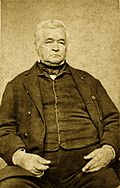| |||||||||||||||||||||
| |||||||||||||||||||||
 County results Hubbard: 40–50% 50–60% 60–70% Crosby: 40–50% 50–60% | |||||||||||||||||||||
| |||||||||||||||||||||
| Elections in Maine |
|---|
 |
The 1850 Maine gubernatorial election was held on September 9, 1850, in order to elect the governor of Maine. Incumbent Democratic governor John Hubbard won re-election against Whig nominee William G. Crosby and Free Soil Party nominee George F. Talbot. [1]


